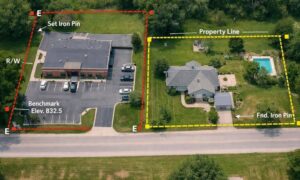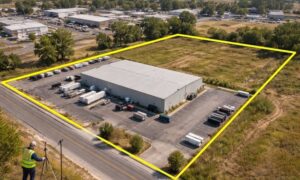
When the Massachusetts Land Court made headlines this week for cracking down on vague power-of-attorney documents, most people saw it as a legal story. But for anyone working in real estate, development, or land surveying, it’s much more than that. This new policy, which stops the use of unclear or off-record authorizations in property transactions, is already raising concerns for lenders and title companies nationwide. And it matters even here in Idaho. If you’re planning a commercial deal, this is a wake-up call. Your ALTA Land Title Survey, the map that lenders and title insurers rely on to approve funding—depends entirely on clear paperwork. When those documents don’t hold up, neither does your timeline.
What the Court Ruling Means
The Massachusetts Land Court announced it will no longer accept powers of attorney that reference off-record or vague documents. In simple terms, every signature and authority in a property deal must now be fully documented, recorded, and verifiable. The goal is to prevent fraud and confusion, but the side effect is slowing down commercial closings.
Here’s why it matters to everyone else: national title underwriters often share compliance policies across state lines. So, even though the decision came out of Massachusetts, the same standards can easily reach Idaho through lender and insurer networks.
That means when you order your next ALTA Land Title Survey, your title company might take a closer look at every name, signature, and authorization tied to the property. If something’s missing or unclear, your survey—and your closing—could be delayed.
Why This Affects Commercial Deals
Nampa and nearby cities are growing fast. Developers are buying older commercial sites, merging parcels, and refinancing projects. Each one of those transactions passes through a title review and a certified land survey before funds are released.
But there’s a catch: the survey can’t move faster than the title. If a title officer spots a vague power of attorney or an unrecorded affidavit, the surveyor must stop until the issue is fixed. Even one unclear signature can pause weeks of work.
Imagine you’re developing a retail complex, and your title commitment lists a power of attorney signed ten years ago by a former property manager. If the court—or your title company—can’t confirm that document’s validity, your lender may refuse to fund. That means your ALTA Land Title Survey can’t be certified, your closing date slips, and your contractors wait on standby.
How It Creates a Domino Effect
Commercial closings depend on clean coordination between three players: the title company, the lender, and the surveyor. When one part of that process stalls, everything else does too.
Here’s how it plays out:
- The title company flags a vague power of attorney.
- They hold off issuing the final title commitment.
- The surveyor pauses fieldwork or certification until title clears.
- The lender delays funding until the survey is updated.
All of this can happen even if the property itself hasn’t changed one inch. It’s not a boundary problem—it’s a paperwork problem. And that’s what makes this ruling so important to understand.
What Makes ALTA Land Title Surveys So Sensitive

An ALTA Land Title Survey isn’t just about drawing boundary lines. It’s a detailed look at how what’s on the ground connects to what’s on record — the fences, driveways, easements, and structures that define a property. In short, it’s the professional land title mapping service that brings legal descriptions to life.
Lenders and title insurers depend on it to confirm that every feature they see on paper truly exists where it should. But that level of trust only works if the title records are complete and verified. When those documents are uncertain, the survey can’t move forward. A single missing or outdated record can throw off certifications, approvals, and closing dates.
That’s why surveyors always require a final, verified title commitment before they stamp their name on a survey. When a new court ruling tightens how powers of attorney or recorded documents are handled, it sends ripples through the entire process — pushing everyone involved to double-check every line, every signature, and every map before the deal can close.
What Developers and Lenders Should Do
The takeaway for developers is simple: your documentation is as important as your design plans. Before you even call your surveyor, talk with your title company. Make sure they have the most current deeds, affidavits, and powers of attorney.
If you’re buying land under an LLC, partnership, or trust, confirm who’s legally authorized to sign. Those extra minutes can save weeks later. Many local surveyors already coordinate directly with title officers before starting fieldwork. This practice—known as a “pre-flight check”—keeps small paperwork issues from becoming big scheduling problems.
Also, remember that the Treasure Valley has seen a rise in multi-parcel transactions and redevelopment projects. These deals often involve multiple ownership layers. Each one must be supported by recorded documentation. If even one entity’s authorization is outdated or incomplete, the ALTA Land Title Survey can’t move forward.
Why It’s Not Just a Legal Issue
This ruling isn’t about lawyers—it’s about timing and trust. In real estate, closing delays cost money. Contractors can’t start, interest rates shift, and sellers lose patience. The lesson from Massachusetts is that clarity now saves frustration later.
In Nampa, where new commercial projects line Garrity Boulevard and Franklin Road, timing matters. If your lender requires an updated ALTA survey but your title package isn’t clear, you could lose an entire construction season. That’s why the smartest developers treat documentation like a foundation—it must be solid before anything else stands on it.
How Surveyors Are Responding
Professional surveyors are used to working through complex documentation. Many are now asking clients for “clean copies” of all recorded powers of attorney and authorization letters before starting. This isn’t red tape—it’s risk control.
Surveyors also know how fast projects move once funding is approved. They prefer to clear any title concerns early rather than reissue certifications later. That helps protect everyone involved: the lender, the buyer, and the property owner.
The Bottom Line
The Massachusetts Land Court’s decision is a reminder that property transactions live or die by their paperwork. A single unclear document can delay an entire commercial closing.
For developers, lenders, and investors, the safest move is to verify everything early. Make sure your title commitment, signatures, and authorizations are complete before ordering your ALTA Land Title Survey. When those pieces align, your project stays on schedule and your closing runs smoothly.
Because in today’s market, speed isn’t about how fast you build—it’s about how well you prepare.





